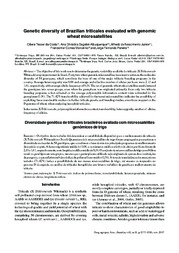Genetic diversity of Brazilian triticales evaluated with genomic wheat microsatellites
Genetic diversity of Brazilian triticales evaluated with genomic wheat microsatellites
Autoria: COSTA, C. T. da; ALBUQUERQUE, A. C. S.; NASCIMENTO JUNIOR, A. do; MARCELINO-GUIMARÃES, F. C.; PEREIRA, J. F.
Resumo: The objective of this work was to determine the genetic variability available for triticale (X Triticosecale Wittmack) crop improvement in Brazil. Forty-two wheat genomic microsatellites were used to estimate the molecular diversity of 54 genotypes, which constitute the base of one of the major triticale breeding programs in the country. Average heterozygosity was 0.06 and average and effective number of alleles per locus were 2.13 and 1.61, respectively, with average allelic frequency of 0.34. The set of genomic wheat microsatellites used clustered the genotypes into seven groups, even when the germplasm was originated primarily from only two triticale breeding programs, a fact reflected on the average polymorphic information content value estimated for the germplasm (0.36). The 71.42% transferability achieved for the tested microsatellites indicates the possibility of exploiting these transferable markers in further triticale genetic and breeding studies, even those mapped on the D genome of wheat, when analyzing hexaploid triticales.
Ano de publicação: 2007
Tipo de publicação: Artigo de periódico
Observações
1 - Por padrão são exibidas publicações dos últimos 20 anos. Para encontrar publicações mais antigas, configure o filtro ano de publicação, colocando o ano a partir do qual você deseja encontrar publicações. O filtro está na coluna da esquerda na busca acima.
2 - Para ler algumas publicações da Embrapa (apenas as que estão em formato ePub), é necessário ter, no celular ou computador, um desses softwares gratuitos. Sistemas Android: Google Play Livros; IOS: iBooks; Windows e Linux: software Calibre.
Acesse outras publicações
Acesse a Base de Dados da Pesquisa Agropecuária (BDPA) para consultar o acervo completo das bibliotecas da Embrapa.

